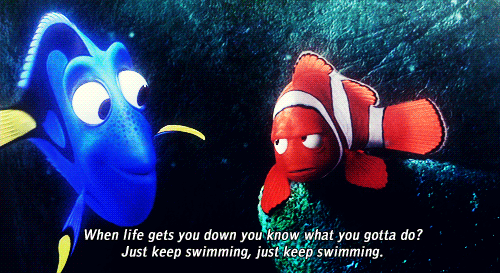Here is a transcript, if you prefer.
I'm going to guess that everyone who watches/reads this will walk away with a different feeling of what the best idea in it is. So I won't claim that what I got out of it is the most important thing in the video. But golly, it's been helpful in the recent past. In case you have no time to watch the whole thing and draw your own conclusions, here's what I'm talking about:
You know I mean, if we have a problem and we need to solve it, until we do, we feel (inside us) a kind of internal agitation, a tension, or an uncertainty that makes us just plain uncomfortable. And we want to get rid of that discomfort. So, in order to do so, we take a decision. Not because we're sure it's the best decision, but because taking it will make us feel better.For me, these kinds of problems are what my characters are going to be like and what made them that way, what the insides of their apartments look like and what kind of clothes they wear, how I'm going to get from point A to point B in the plot without boring the reader or jumping too awkwardly. Solutions to problems both small and large.
Well, the most creative people have learned to tolerate that discomfort for much longer. And so, just because they put in more pondering time, their solutions are more creative.
Actually, I can give you an example of a problem where I haven't given up when the simple answer arrived. In my KUFC book, the antagonist group has put together an energy initiative which causes serious harm to my main character and her people. This is in an alternate-history U.S., in the 1940s, and it's a project that is extremely harmful to the earth but on which the antagonist group has put a positive spin, claiming it creates natural, sustainable energy for the general populace. I thought for ages trying to come up with a name for this project. The name had to be slick and memorable, had to indicate both benignity and corporatism, and had to be a word that would eventually make my main character shudder at its very thought. And the only word I could come up with, after thinking and thinking, was Greenpeace. Which is a word that, as most of us know, already exists and has its own connotations and that I can't possibly use.
I argued to myself that I could use it, that it would be a sly wink to the real 21st-century reader, would be yet another clue (as if the reader needs one at the juncture of the book where the project appears) that this was an alternate timeline. I almost convinced myself - but no. It's not the right word. I have to find another one. I'm still sitting solutionless under this problem, BUT, thanks to John Cleese, I'm not afraid of the discomfort of not having that solution yet. I'm using Greenpeace in my notes for the time being, until I come up with the right word, but I'm determined that there'll be another solution coming along sometime in the future. Because this is a shoddy solution and it won't do.
There's a way in which this instinct toward pushing on through discomfort to find the Right solution - not just the convenient one - ties in to perfectionism, which makes me, a recovering perfectionist, very uncomfortable. It's the same little voice, saying keep going because that's not a good enough solution, that dogged me and paralyzed me with not good enough not good enough not good enough for so many years. I don't want to venture into dividing perfectionism into good and bad, because I really couldn't say without bias, but I think driving on with intention toward the best solution is a different thing than failing to start because you can't achieve the ideal solution.
In the past week, I've started to believe keep going is really the only thing that works. It's certainly how I got through the hardest times in my life, and it's simple and catchy enough to sit in my brain without meanness and motivate me. It's how I wrote 2,000 words last night that I trust. Hard to argue with results like that.

No comments:
Post a Comment